National Audit Office warns of lack of Brexit preparations at UK border and by traders.
Six out of eight critical IT systems required to allow the UK’s borders to function under a no-deal Brexit are in danger of not being ready, Whitehall’s spending watchdog has found.
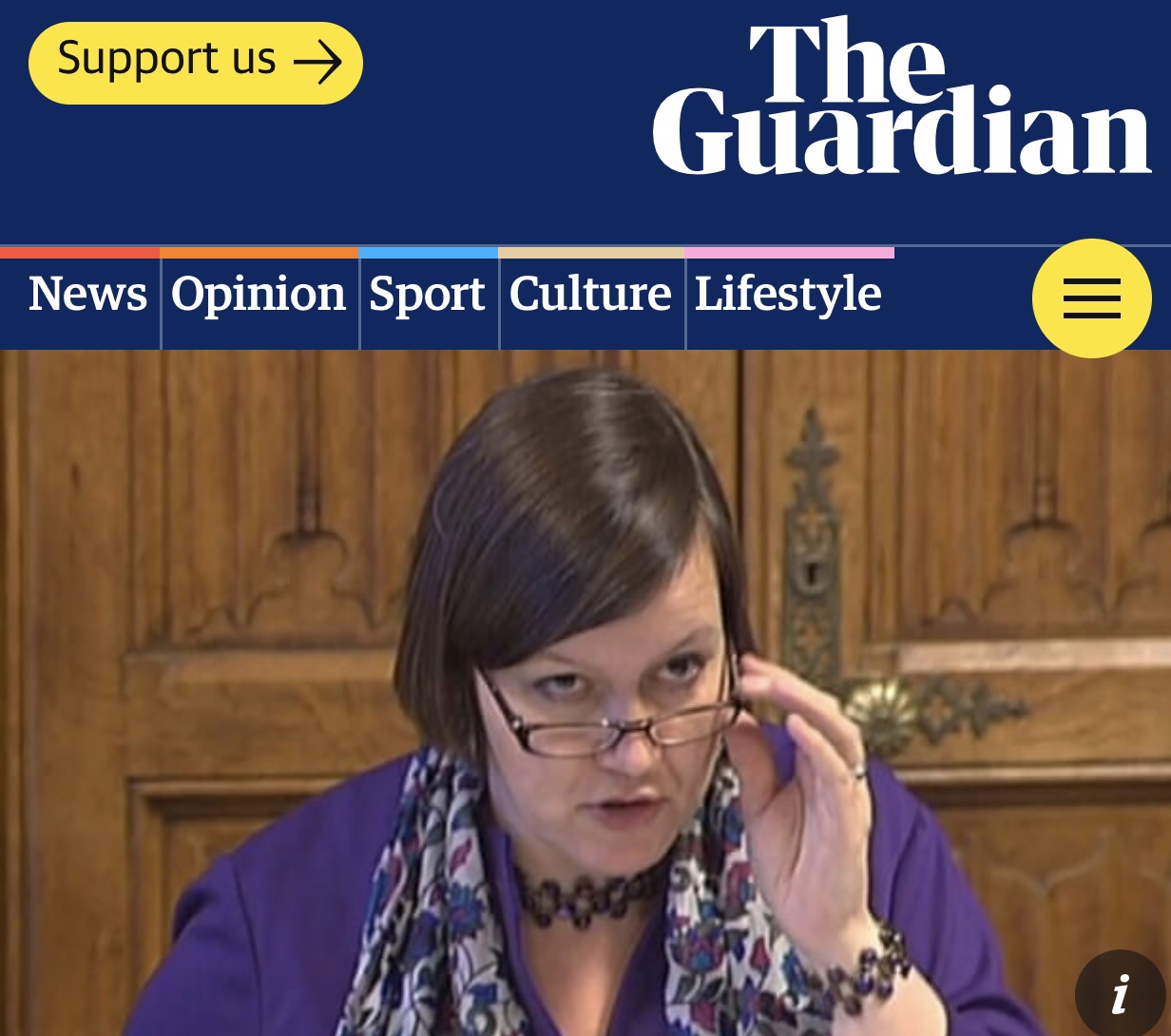
The National Audit Office has also concluded that with 31 days to go before the UK is due to leave the EU, the readiness of UK’s businesses are a “red-rated” risk if the government crashes out of Europe.
The findings were released on Wednesday evening in a memo sent to the public accounts committee.
Meg Hillier, the chair of the committee, said serious questions remained about whether the UK would be prepared at the border, and what this would mean for individuals and businesses.
“It is alarming that six of the eight critical IT systems needed are in danger of not being ready in time and that government assesses readiness of traders as one of its most significant risks,” she said.
The report examined eight systems at the border across departments including HM Revenue and Customs, Defra, the Food Standards Agency and the Department for International Trade.
One IT project, the Automatic Licence Verification System – which was meant to allow the importation of regulated horticultural, plants, live animals and animal products – had deteriorated since last September, the report found.
The Import of Products, Animals, Food and Feed System, developed to control the importation of animals and high-risk food and feed from the EU, still had the same risk profile as six months ago, auditors said.
Auditors noted that this month civil servants rated the risk to trader readiness as “red-rated”.
“A survey of external readiness commissioned by government in December 2018 found that 31% of businesses cited lack of knowledge as a barrier preventing preparedness, and that 50% of small businesses were yet to take action to prepare for no deal,” the report said.
A government spokesperson said the report showed “real progress” had been made at the UK’s borders. “We have also taken steps to minimise disruption through phasing in certain checks required at the border and continuing to apply the risk-based approach to customs checks we use today,” he said.
“The necessary resources we need to keep the border secure will be in place, including an additional 900 Border Force officers by March 2019, and we’ve been communicating extensively with businesses about the steps they need to take to prepare.”
Source: The Guardian
UK Government has published a report on Implications for Business and Trade of a No Deal Exit on 29 March 2019.
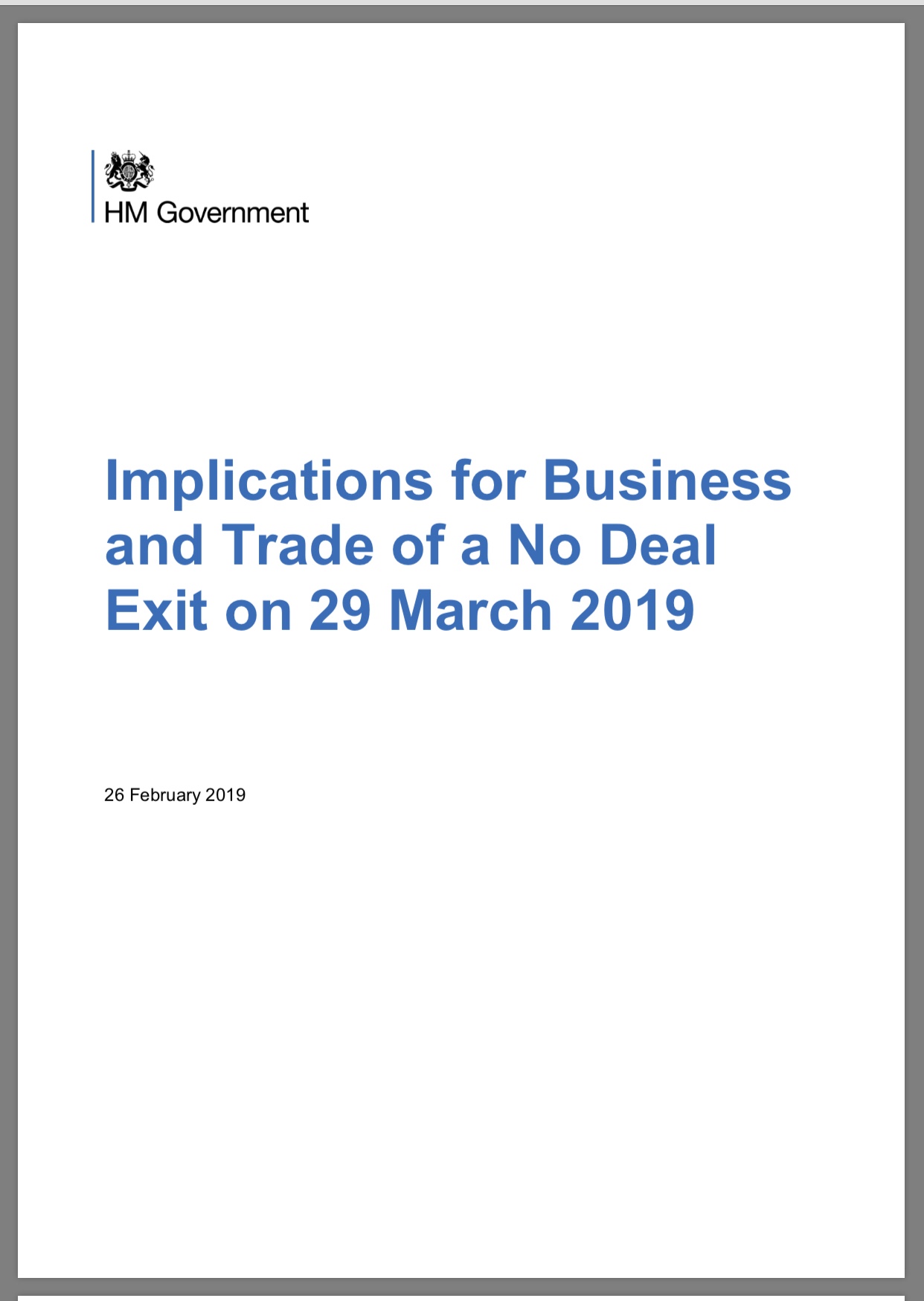
You find the report here; Implications for business and trade of a no deal exit on 29 March 2019
Theresa May has promised MPs a vote on delaying the UK’s departure from the EU or ruling out a no-deal Brexit, if they reject her deal next month.
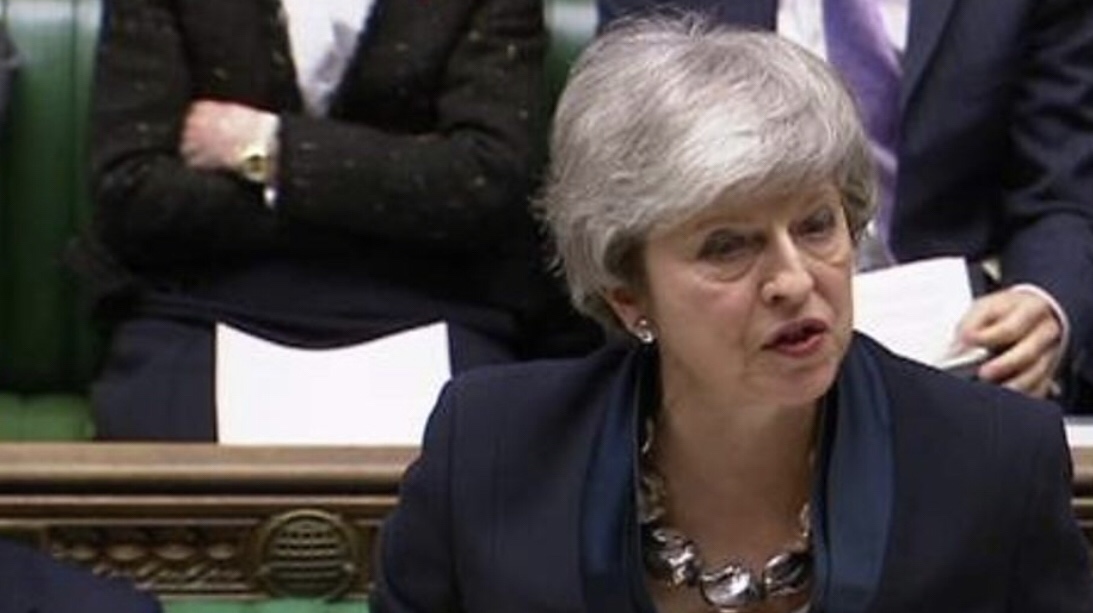
Mrs May made a statement to MPs about Brexit on Tuesday, amid the threat of a revolt by Remain-supporting ministers.
The prime minister promised MPs a meaningful vote on her Brexit deal by 12 March.
Labour leader Jeremy Corbyn accused the prime minister of another “grotesquely reckless” Brexit delay.
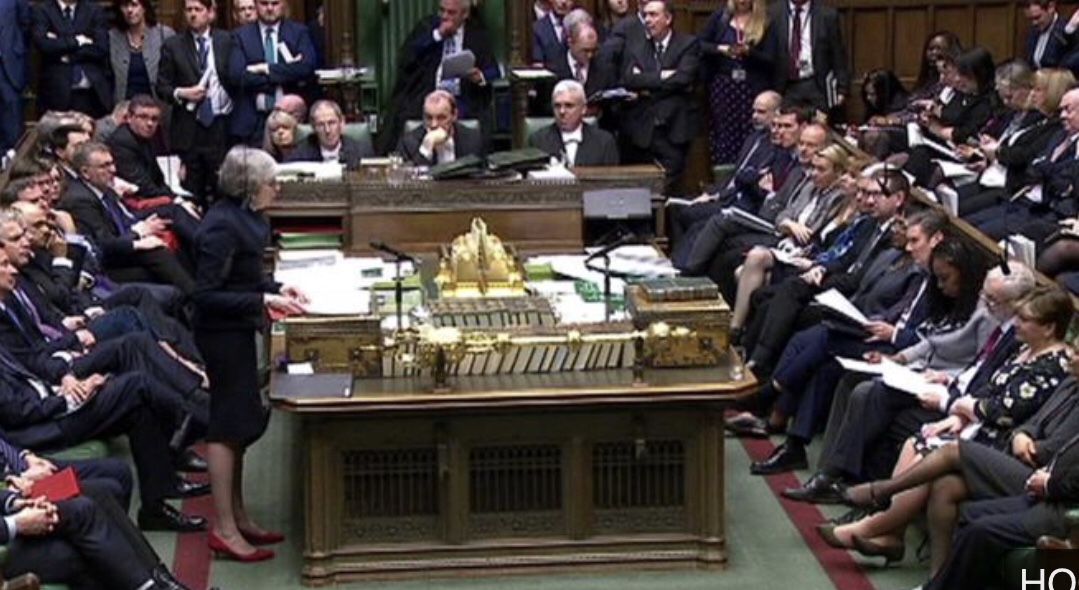
The prime minister said she will put her withdrawal agreement – including any changes she has agreed with the EU – to a meaningful vote by 12 March.
If that fails, MPs will be offered two separate votes:
▪ One, on the following day, on whether MPs support a no-deal Brexit – so the UK would “only leave without a deal on 29 March if there is explicit consent in the House for that outcome”
▪ If that fails, then MPs will get a vote by 14 March on requesting an extension to the two-year Article 50 negotiation process to delay EU withdrawal beyond 29 March
“Let me be clear, I do not want to see Article 50 extended,” she told MPs.
“Our absolute focus should be on working to get a deal and leaving on 29 March.”
Any extension should not go beyond the end of June and “would almost certainly have to be a one-off”, she added.
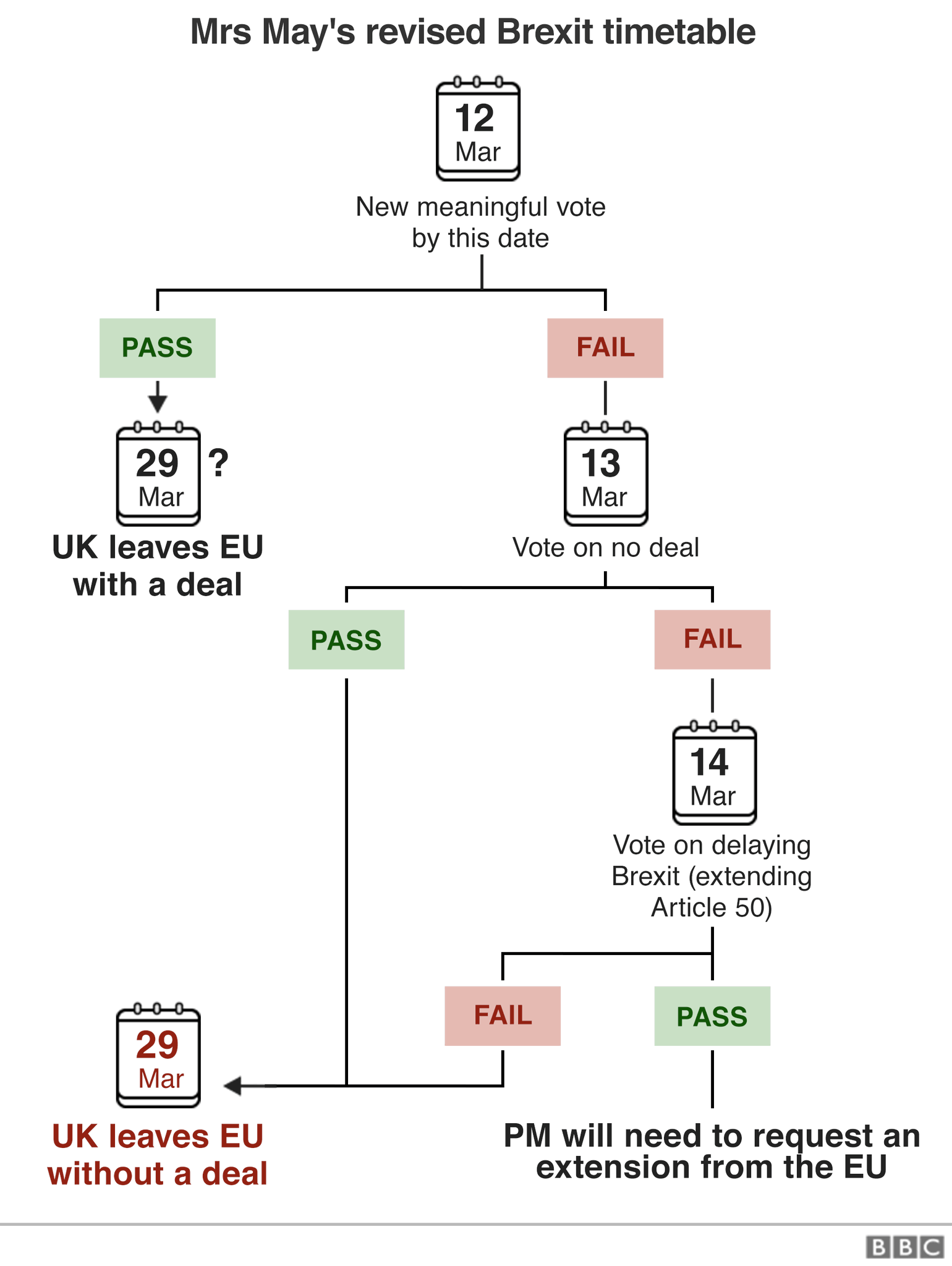
Mrs May said an extension “cannot take no deal off the table”, adding: “The only way to do that is to revoke Article 50, which I shall not do, or agree a deal.”
Extending Article 50 would require the unanimous backing of the other 27 EU member states and, she said, she had not had conversations about it with them.
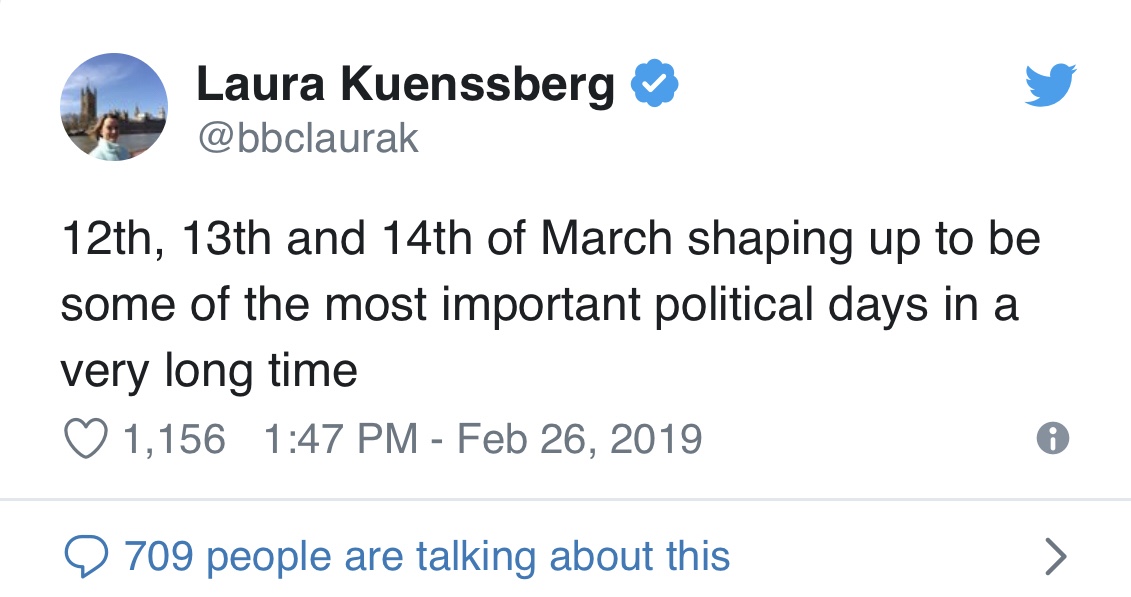
Mrs May repeatedly declined to say whether she would vote against a no-deal Brexit, and whether Tory MPs would be whipped to vote for or against it.
Theresa May’s big concession – and it was a significant tactical retreat – was about buying herself more time.
So now, under the threat of maybe 15 to 20 ministers rebelling, the prime minister’s promised MPs an opportunity next month to rule out a no-deal Brexit, and force a “limited” delay in leaving the EU.
Without that promise, there’s every chance those unhappy ministers would have joined other MPs in voting to rule out no-deal and delay Brexit anyway.
She did not offer ministers freedom to vote as they choose. So now the (potential) rebels must decide whether to hold fire for a fortnight, while she tries to get terms in Brussels she can sell to the Commons – hoping Brexiteers ultimately back her deal as the best Brexit available.
Call it “running down the clock”, or “kicking the can down the road”, if you like.
But kicking and running has been Mrs May’s best hope for months.
Source: BBC News






You must be logged in to post a comment.